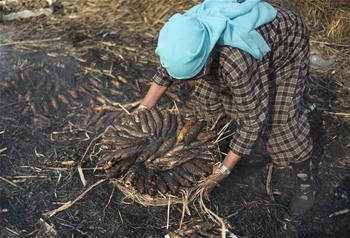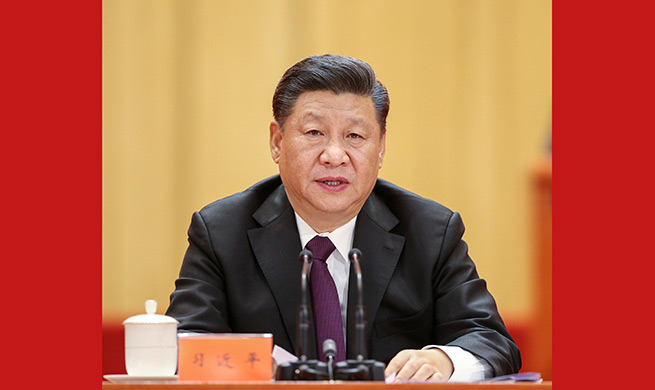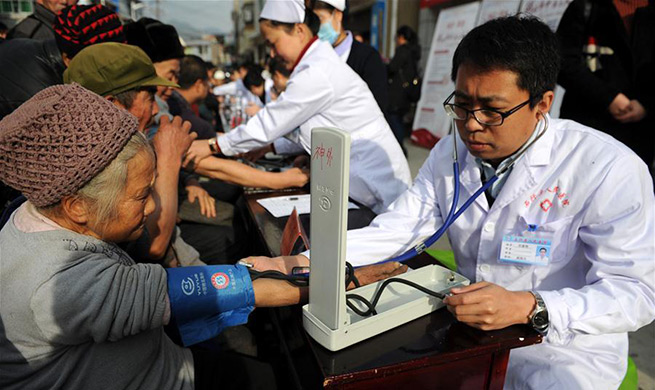by Murad Abdo
ADEN, Yemen, Dec. 18 (Xinhua) -- The ceasefire brokered by the United Nations took effect in Yemen's Red Sea port of Hodeidah early Tuesday, bringing about relative calm to the conflict-battered city following days of intense battles.
Still, Yemeni government forces and the Houthi rebels accused each other of breaching the ceasefire, raising worries about a possible resumption of full-scale conflict.
But local residents confirmed to Xinhua that there were no sounds of heavy gunfire on Tuesday across the city, which had been hit by days of ferocious street fightings, forcing thousands of people to flee into other safe areas.
The relative calm came after leaders of the two warring sides reaffirmed their commitment to adhering to the ceasefire deal signed last week in Sweden, by ordering all their military commanders on-ground to lay down arms starting at midnight local time.
The Saudi-backed Yemeni government said in a statement that it respects its obligations to the text and spirit of the Stockholm agreement and has always sought to achieve real changes on the ground, to alleviate the people's suffering and find a lasting peace.
"The Houthis must adhere to the modalities stipulated, cease any further hostilities and show its full commitment for peace," the statement said.
The government said that it will continue supporting the UN efforts "to avert any humanitarian and food insecurity concerns fostered or exacerbated by Houthi misdeeds."
On the other side, Mohammed Abdul-Salam, spokesman of the Houthi rebel group, reaffirmed Houthis' "commitment to Stockholm's accord and the ceasefire in Hodeidah."
The ceasefire deal signed between the two warring rivals last week in Sweden called for full withdrawal of all armed groups from Hodeidah and its strategic seaport.
Under the deal, the UN will manage the port and supervise the redeployment of neutral forces there to prevent military escalation, while local forces will help support law and order in the city.
The two warring sides named their representatives who will join he Redeployment Coordination Committee (RCC), the joint committee in charge of implementing the Hodeidah agreement according to the UN-backed ceasefire deal agreed in Sweden.
Hodeidah residents said that tense calm returned to the neighborhoods in the city, despite the deployment of the fighters belonging to the two warring sides in and around the city.
Thabit Ahmed, one of Hodeidah residents, told Xinhua by phone that "heavy artillery shelling stopped just a few hours after the ceasefire went into effect."
"The situation is calm now although tense because we don't really know what's going to happen in the next hours," he said.
He added that some stores and businesses reopened Tuesday while many workers started going to their work.
Local observers fear that the ongoing sporadic clashes did not stop and may lead to derailing the ceasefire completely, sparking a large-scale fighting again in Hodeidah.
Salah Bin Laghbar, a politician and observer based in Aden, said that implementing the UN-backed ceasefire will face many huge challenges.
"The Houthis are just lawless militiamen and it's not an easy task to convince them to put arms down because they only understand fighting everywhere and anytime," he said.
Mamun Mahjami, spokesman of the pro-government Giants Brigades, told Xinhua by phone that he believed that the Houthis are exploiting the ceasefire to mobilize and reposition their fighters in Hodeidah.
"The Houthis are escalating the situation militarily and some of their fighters attempted to change their sites and advance into our positions," the spokesman said.
He added that "some militiamen of the Houthi group don't abide by the orders coming from their leaders and keep attacking the positions of our forces despite the ceasefire."
Two days ahead of the ceasefire, fierce armed confrontation broke out between the two warring sides in different areas of Hodeidah, causing heavy casualties.
The Houthis launched a large military campaign and seized the capital Sanaa in late 2014 along with other main provinces, forcing Yemen's president and his government to flee into the southern port city of Aden.
A Saudi-led Arab military coalition intervened militarily in 2015 and began pounding the Houthi-controlled capital Sanaa in a bid to restore the internationally-recognized Yemeni government.
The war in Yemen has aggravated the suffering of Yemenis and deepened the world's worst humanitarian crisis, where three quarters of the population, or more than 22 million people, urgently need humanitarian assistance.

















